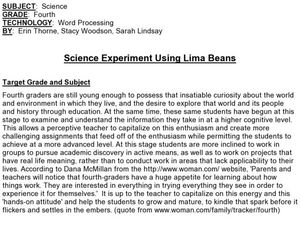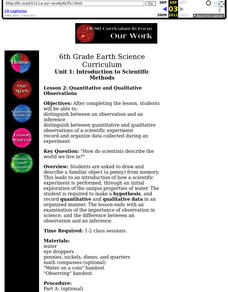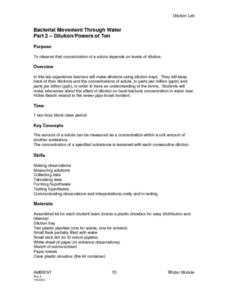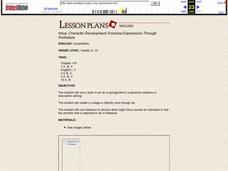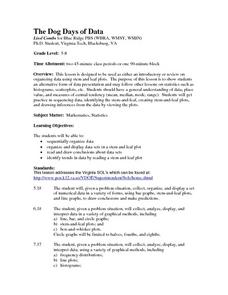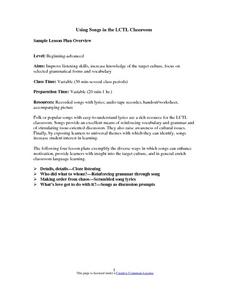Curated OER
Location, Location, Location: Using a Grid to Determine Context
Seventh graders are introduced to making inferences about artifacts. Using a grid system, they locate the artifacts and determine where they originated from. They use this information to make conclusions about the way people lived...
Curated OER
Pre- and Post-Reading Plan
Young scholars are introduced to pre- and post-reading strategies. Individually, they read excerpts of a story while making predictions about what they believe is going to happen next. After reading the selection, they answer...
Curated OER
Mr. Cobbler's Shoe Dilemma
Students employ statistics to solve real-world problems. They collect, organize and describe data. They make inferences based on data analysis. They construct, read, and interpret tables, charts and graphs.
Curated OER
Civil War Music - Irish Folk Songs
Students determine what it was like to serve as an Irish-American in the American Civil War. In this Irish folk song lesson, students use the provided worksheets to analyze selected Irish folk songs and make inferences about war...
Curated OER
Archeology of the Future
Students are introduced to the basic vocabulary of archeology. Using the vocabulary, they classify artifacts and make inferences about their uses. In groups, they create a chart for the criteria needed to analyze artifacts and share...
Curated OER
Science Experiment Using Lima Beans
Fourth graders tie together elements about the world and their environment. Students incorporate styles of higher order thinking skills. Students measure skills of observations, conclusions, inferences and predictions.
Curated OER
Enrichment Activities - "Mrs. Frisby and the Rats of NIMH"
Fifth graders read the novel "Mrs. Frisby and the Rats of NIMH." They discuss the various characters in the book, and the different types of conflict that take place within the book. They also research owls and rats to make comparisons...
Curated OER
Height of Bounce
Eighth graders determine the relationship between the height of bounce of a ping-pong ball and the height from which it was dropped. They are assessed on the ability to record and interpret data, graph data, make predictions, and make...
Curated OER
Statistics and Shopping
Students explore the concept of using consumer data and statistics to aid in the consumer decision making process. In this consumer data and statistics lesson, students research consumer data and statistics. Students analyze the data...
Curated OER
Dig It Up
Students participate in an archaeological excavation to determine how archeologists make inferences about various cultures. They reconstruct the site using layers of drawings. They discuss the kinds of information they learned.
Curated OER
Introduction to Scientific Methods
Sixth graders distinguish between an observation and an inference distinguish between quantitative and qualitative observations of a scientific experiment. They record and organize data collected during an experiment.
Curated OER
Bacterial Movement Through Water Part 2- Dilution/Powers of Ten
Students make dilutions using dulution trays. They keep track of their dilutions and the concentrations of solute, to parts per million (ppm) and parts per billion (ppb), in order to have an comprehension of the terms. Students make...
Curated OER
Bibim Bap For Dinner
Young scholars participate in a literature analysis while reading the children's book "Bibim Bap For Dinner". The teacher performs a guided reading with the students while focusing on the skill of recognizing the main theme of the book....
Curated OER
African Dance: Drumbeat In Our Feet
Second graders read "African Dance: Drumbeat in Our Feet". In groups, they identify the message of the story and discuss a personal experience that relates to a part of the book. They practice reading fluently as a class and making...
Curated OER
Balloon Rocket
Students observe a balloon rocket and how it relates to Newton's Third Law of Motion. In this balloon rocket lesson plan, students make a balloon rocket out of balloons, clothespins, straw, fishing line, and duct tape.
Curated OER
CHARACTER DEVELOPMENT: EXAMINE EXPRESSIONS THROUGH PORTRAITURE
Students use a work or art as a springboard to a personal narrative or descriptive writing, create a collage to identify tone through art, and use inference to discern what might have caused an individual to feel the emotion that is...
Curated OER
Solar Kit Lesson #1 Solar Cell Inquiry
Students use a selection of solar panels, lamps, motors, and an AA battery to get as many motors or lights to operate as they can in an allotted time period. For each successful arrangement, they draw a diagram of their setup, label the...
Curated OER
The Dog Days of Data
Students practice an alternative form of data presentation. They practice sequencing data, identifying the stem-and-leaf, creating stem-and-leaf plots, and drawing inferences from the data by viewing the plots.
Curated OER
The Dog Days of Data
Learners are introduced to the organization of data This lesson is designed using stem and leaf plots. After gather data, they create a visual representation of their data through the use of a stem and leaf plot. Students
drawing...
Curated OER
The Human Line Plot
Fifth graders collect data and use charts and line plots to graph data. Through class surveys, 5th graders collect data concerning a particular subject. They graph their data using a line graph. Students make inferences and predictions...
Curated OER
Night of the Twister
Students use reading strategies for Night of the Twister. In this reading strategies lesson, students name five major catastrophes and books about each. Students complete a vocabulary section, make inferences and predictions, read the...
Curated OER
Sun, Shadows, Surface Structure...and the Face on Mars
Students use light and shadow information to make inferences regarding the three dimensional shapes of specific objects photographed on the surface of Mars. Limitations of the of the data provided are discussed and entries made into the...
Curated OER
Amazon Adventure: a Case Study in Medical Technology And Bioethics
Students test problem-solving skills, the ability to see connections, and the ability to draw conclusions and inferences from information provided in a case study. Given a case study, they formulate a procedure and draw conclusions.
Curated OER
Using Songs in the LCTL Classroom
Students in a beginning to intermediate foreign language/ESL classroom complete a variety of activities involving music and lyrics that are designed to enhance their listening and vocabulary skills. They practice grammar and making...







